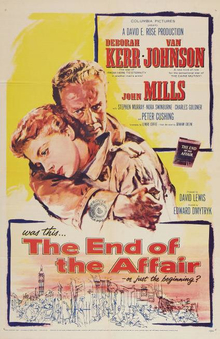Plot
Writer Maurice Bendrix settles in London in 1943–44 after being wounded in the war. His affair with Sarah Miles, wife of civil servant Henry Miles, "grows into a deep and abiding passion." Maurice becomes jealous. He wants to marry Sarah, but she won't leave Henry yet.
Maurice's apartment is hit by a buzz bomb. He revives and pulls himself from the rubble to find Sarah kneeling on the floor. As she tends to his wounds, he asks her why she was kneeling. She says she was praying and was certain he was dead. She stares at him, her face wet with tears, then leaves abruptly. He runs after her, but finds the street empty. Maurice suffers from delayed shock and is bedridden for several days. When he recovers, he tries in vain to reach Sarah and his "jealousy turns to hate."
A year later, the war is over. Maurice struggles with his book and his hate for Sarah. One rainy night, he sees Henry. Henry is worried about Sarah and invites Maurice over for a drink. Sarah, who "is out at all hours," returns soaking wet, and is vague and detached with Maurice and Henry. Maurice confronts Sarah, who takes all the blame.
Parkis, a private investigator, reports to Maurice in the darkened flat. He describes Maurice's meeting with Sarah in detail, interpreting it as a final parting and describing Sarah as "looking ready to weep her eyes out." Maurice reveals himself, saying the parting was long ago. Parkis has the bottom of a discarded note in Sarah's handwriting that reads "Nothing matters except that we should be together, now and forever."
Parkis obtains Sarah's journal, observing that she appears to be very ill. As Maurice reads the journal, we hear Sarah's voice describing the past year. Maurice lies in the rubble. Sarah takes his hand, then returns to his room. Weeping, she prays: "I love him, I'll do anything... I'll give Maurice up forever, only just let him be alive!" Maurice calls her name. She plans to tell him about her "hysterical" promise, but then he seems to remember what it was like to be dead. "Now the agony of being without you starts," she writes. At home, Henry tells her that Maurice has been taken to a hospital with delayed shock.
Suddenly Sarah wants Maurice beside her. She confides in a Catholic priest and asks: "What does God want with me?" She lights a candle and for the first time in months feels "a little tremble of happiness." At home, she finds Maurice with Henry. It took "everything she had" to walk up the stairs. She writes a love letter, records it in the diary and tears it up, creating the scrap of paper Parkis found.
She tells her friend, Richard Smythe, she is going back to Maurice because she believes God will love her even if she breaks her vow. But when Henry tells her how much he needs her, she promises not to leave him.
The diary ends with a cry of pain and love for Maurice. He closes the journal and phones her. She begs him not to come. He pursues her to the church through pouring rain, promising they will be together.
Maurice comes to the house and finds Sarah is dying. At home, he finds a letter from Sarah that says she can never see him again, and that she has never loved as she loves him. Maurice replies: "Have it your way, Sarah. I believe that you live and that He exists. But I'm tired. Just give me a little time..." [2]
